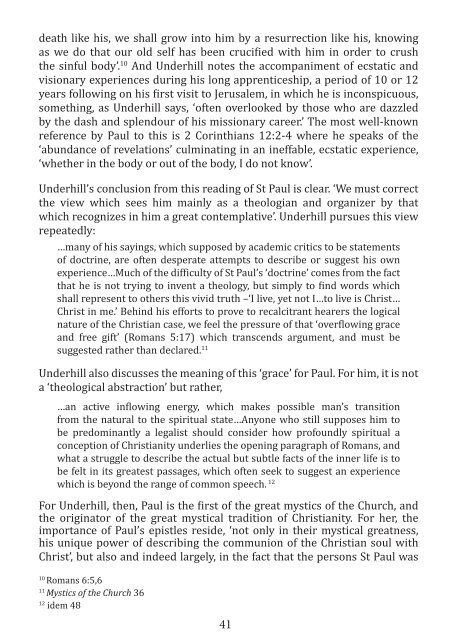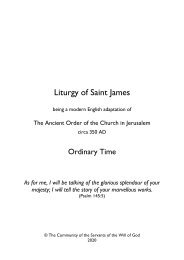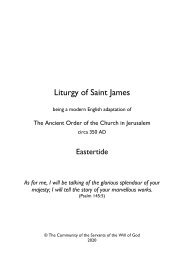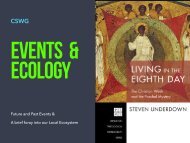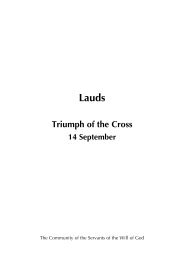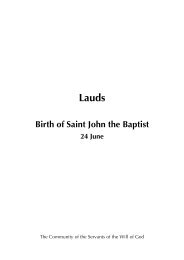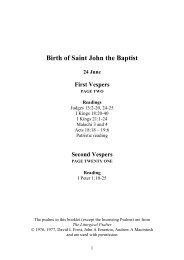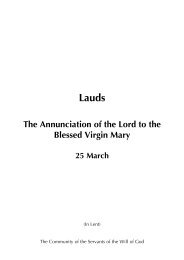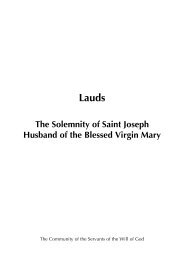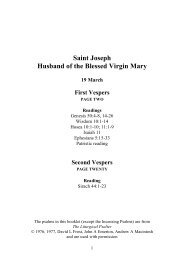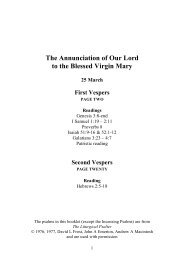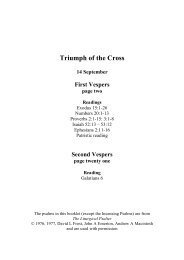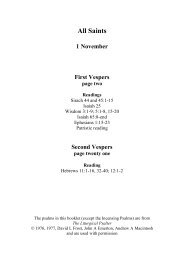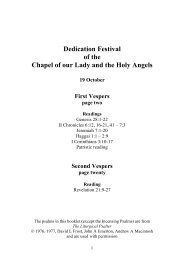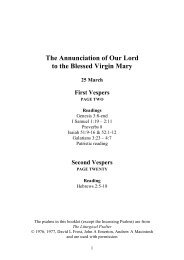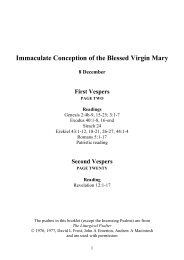In Praise of Holy Women
'Come to the Father' is the official journal of the Anglican Community of the Servants of the Will of God, Sussex, England, a contemplative monastic order for men and women founded in 1938. The aim of the journal is to maintain a dialogue between the Churches - East and West. This issue features articles on Evelyn Underhill, Julia DeBeausobre, Therese of Lisieux, Sister Joanna Reitlinger and Dorothy Day.
'Come to the Father' is the official journal of the Anglican Community of the Servants of the Will of God, Sussex, England, a contemplative monastic order for men and women founded in 1938. The aim of the journal is to maintain a dialogue between the Churches - East and West. This issue features articles on Evelyn Underhill, Julia DeBeausobre, Therese of Lisieux, Sister Joanna Reitlinger and Dorothy Day.
Create successful ePaper yourself
Turn your PDF publications into a flip-book with our unique Google optimized e-Paper software.
death like his, we shall grow into him by a resurrection like his, knowing<br />
as we do that our old self has been crucified with him in order to crush<br />
the sinful body’. 10 And Underhill notes the accompaniment <strong>of</strong> ecstatic and<br />
visionary experiences during his long apprenticeship, a period <strong>of</strong> 10 or 12<br />
years following on his first visit to Jerusalem, in which he is inconspicuous,<br />
something, as Underhill says, ‘<strong>of</strong>ten overlooked by those who are dazzled<br />
by the dash and splendour <strong>of</strong> his missionary career.’ The most well-known<br />
reference by Paul to this is 2 Corinthians 12:2-4 where he speaks <strong>of</strong> the<br />
‘abundance <strong>of</strong> revelations’ culminating in an ineffable, ecstatic experience,<br />
‘whether in the body or out <strong>of</strong> the body, I do not know’.<br />
Underhill’s conclusion from this reading <strong>of</strong> St Paul is clear. ‘We must correct<br />
the view which sees him mainly as a theologian and organizer by that<br />
which recognizes in him a great contemplative’. Underhill pursues this view<br />
repeatedly:<br />
…many <strong>of</strong> his sayings, which supposed by academic critics to be statements<br />
<strong>of</strong> doctrine, are <strong>of</strong>ten desperate attempts to describe or suggest his own<br />
experience…Much <strong>of</strong> the difficulty <strong>of</strong> St Paul’s ‘doctrine’ comes from the fact<br />
that he is not trying to invent a theology, but simply to find words which<br />
shall represent to others this vivid truth –‘I live, yet not I…to live is Christ…<br />
Christ in me.’ Behind his efforts to prove to recalcitrant hearers the logical<br />
nature <strong>of</strong> the Christian case, we feel the pressure <strong>of</strong> that ‘overflowing grace<br />
and free gift’ (Romans 5:17) which transcends argument, and must be<br />
suggested rather than declared. 11<br />
Underhill also discusses the meaning <strong>of</strong> this ‘grace’ for Paul. For him, it is not<br />
a ‘theological abstraction’ but rather,<br />
…an active inflowing energy, which makes possible man’s transition<br />
from the natural to the spiritual state…Anyone who still supposes him to<br />
be predominantly a legalist should consider how pr<strong>of</strong>oundly spiritual a<br />
conception <strong>of</strong> Christianity underlies the opening paragraph <strong>of</strong> Romans, and<br />
what a struggle to describe the actual but subtle facts <strong>of</strong> the inner life is to<br />
be felt in its greatest passages, which <strong>of</strong>ten seek to suggest an experience<br />
which is beyond the range <strong>of</strong> common speech. 12<br />
For Underhill, then, Paul is the first <strong>of</strong> the great mystics <strong>of</strong> the Church, and<br />
the originator <strong>of</strong> the great mystical tradition <strong>of</strong> Christianity. For her, the<br />
importance <strong>of</strong> Paul’s epistles reside, ‘not only in their mystical greatness,<br />
his unique power <strong>of</strong> describing the communion <strong>of</strong> the Christian soul with<br />
Christ’, but also and indeed largely, in the fact that the persons St Paul was<br />
10<br />
Romans 6:5,6<br />
11<br />
Mystics <strong>of</strong> the Church 36<br />
12<br />
idem 48<br />
41


